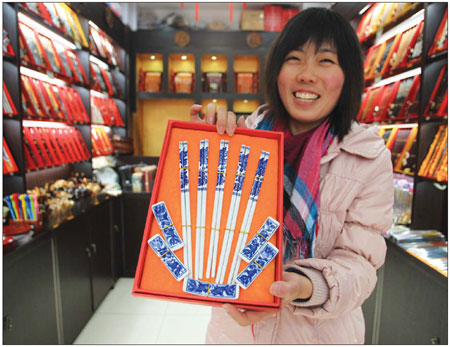Reusable?chopsticks are becoming a popular gift among a new eco-friendly generation.
More than 30 percent of the world uses chopsticks and these simple eating utensils have been placed on Asian dinner tables for thousands of years. But these icons of Chinese culture are today also acting as special presents with special symbolic meaning. And the younger generation also wants to cut down on the estimated 45 billion pairs of wooden chopsticks dumped in rubbish bins each year.
|

Creative designer Xing Junming shows off a decorative set of chopsticks. Chinese zodiac animal designs are popular with European tourists.
|
"I've given a pair of personalized chopsticks as a gift to all the guests at my wedding ceremony," says 26-year-old newly Wed Victoria Duan.
"Each pair of chopsticks is laser engraved with mine or my husband's name, our wedding date, as well as being printed with one of our cartoon figures," she says.
"The chopsticks say that my husband and I will always be a pair and will never be apart.
"We also wish all the guests happiness forever, because chopsticks bear a similar Chinese pronunciation to that of happiness."
Chopsticks in Mandarin is kuai zi (筷子) and happiness is kuai le (快樂).
Ornately decorated chopsticks have been a favorite for European tourists and airport gift shops are filled with a colorful array of these souvenirs.
Now the demand for specially decorated dining utensils is reaching new heights in the land where they were invented and one young entrepreneur has taken advantage of the renewed interest.
Su Wei, 23, runs a Beijing shop and online store, which specializes in souvenir chopsticks and has enjoyed booming sales since he began business two years ago.
Su opened his online store with an initial investment of only 500 yuan (55 euros) on Taobao.com, China's largest online marketplace, in an effort to earn himself pocket money.
"I didn't intend to make a big fortune at the beginning, I only invested money that I could afford to lose," he says. "I tried to minimize my risk by selling daily necessities, such as chopsticks, because everyone needs them."
Su decided to aim upmarket and offered a selection of chopsticks with intricate designs and varied materials, such as ebony, rosewood, bone, seashell, jade and silver.
Within two days, Su struck gold and received a 20,000 yuan (2,200 euro) order from a businessman in Yichang, in Central China's Hubei province. The executive wanted to buy ebony chopsticks with silver tips as a special gift for his clients.
Su quickly contacted a manufacturer in Fujian province and two days later, the goods were delivered.
The college dropout this year averages 5,000 yuan of chopsticks sales each day. This figure soars during Chinese festive seasons, and jumps on auspicious days, such as Nov 11, a day represented by four digits of 1 and dubbed "singles day" by young people.
"It's really funny that some young people, especially girls, buy chopsticks from me as a gift to their close single friends or even for themselves to say goodbye to their single life as soon as possible," he says.
"Chopsticks have been imbued with particular auspicious meanings on different occasions, so everyone, regardless of age and gender, can find a suitable pair to pass on their blessing or convey a certain message to the receiver.
"And at parties or weddings, people want to save these good-looking chopsticks as souvenirs because they are reusable."
With the support of his parents, Su opened a small boutique shop in 2008 in Dashilar Street, one of the oldest pedestrian shopping districts in downtown Beijing. Prices vary from 40 yuan to 168 yuan a pair.
His diversity of products is attracting not only native Chinese, but also curious foreigners. "The two extremely popular designs for foreigners are the chopsticks engraved with Peking Opera masks or those decorated with the Chinese zodiac animals," he says, adding that Chinese patrons prefer chopsticks engraved with golden dragons, phoenix patterns or Chinese surnames for gifts.
These customized chopsticks have become a new hit in Su's shop.
"Because the laser actually burns into the wood, your personalized message will not fade or wash off over time," explains Xing Junming, a shop assistant who is also the creative designer.
Su has recently introduced an eco-friendly line of chopsticks, which are made with recycled materials and can be folded for easy carrying.
"With people's growing awareness of environment protection, I believe those reusable tableware will ultimately replace their disposable counterparts," he says.
"Those green chopsticks will probably become a trend-setting product in the near future."
Chinese authorities launched a campaign in June this year to cut down the use of disposable wooden chopsticks.
It has been reported that an estimated 45 billion pairs of chopsticks are thrown away each year and attempts to encourage diners to use reusable chopsticks in the past have faced difficulties because of hygiene concerns.
However, Ma Yanhua, the director of the Department of Industry Development of the China Cuisine Association, says that thanks to the new campaign and more environmental awareness more people are now taking their own chopsticks to restaurants and more eateries are providing reusable chopsticks at tables.
"The luxury restaurants have banned the use of wooden disposable chopsticks, but roadside eateries and Chinese fast-food outlets continue using the wooden disposable chopsticks," Ma says.
(China Daily December 6, 2010)